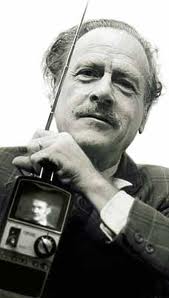“Today, after more than a century of electric technology, we have extended our central nervous system itself in a global embrace, abolishing both space and time as far as our planet is concerned,” is just one of the many famous quotes by Marshall McLuhan, this particular quote is found in Understanding Media, 1964. Born as Herbert Marshall McLuhan in Edmonton, Alberta, Canada, on July 21, 191, McLuhan lived a long and extremely prosperous life.
Recently, in my Survey class we were told to write about this man. I personally questioned, “What’s so great about this guy?” as I began to look up articles, movies, and videos about him. I started to realize how much he truly did change the outlook on Media to this day.
Throughout his life he attended college at the University of Manitoba and, of course, Cambridge University. In 1939 he married, Corinne Keller Lewis of Fort Worth, Texas. But not letting marriage slow him down, by 1942 he received his doctorate began to teach, write, and basically do anything his little heart desired. He even received quite a few honorable awards ranging from, “Honorary Award in Culture and Communication” in 1967 to “Man of Achievement” in 1975, with many others in-between.
But, I’m not here to tell the world about how great McLuhan was, I’m here to talk about why the heck this guys matters today, to communications. Not only to adults but STUDENTS too!
McLuhan believed that the print revolution begun with Gutenberg, the “forerunner” of the industrial revolution. One unforeseen consequence of print was the fragmentation of society.
McLuhan argued that readers would now read in private, and so be alienated from others. “Printing confirmed and extended the new visual stress. It created the portable book, which men could read in privacy and in isolation from others,” McLuhan said.
On the other hand, his “global village” theory allowed the ability and access of electronic media to create a unity of groups among people. What McLuhan did not live to see, but maybe perhaps saw in the future, was the merging of text and electronic mass media, in this new media called the Internet. Thus, to answer the question, “Why does this pertain to students today?” The INTERNET!
Marshall McLuhan was the first person to popularize the concept of this global village and to consider its actual social effects among people and their lives. His insights were completely and utterly revolutionary at the time and changed how everyone has thought about media, technology, and communications ever since.
McLuhan came up with the phrase “global village” to show his observation that the media was rapidly integrating the planet. Like, events in one part of the world could be experienced from other parts of the world in real-time; this is what human experience was like when we lived in small villages or colonies.
While McLuhan made this concept popular, yet he was not the first to think about the unifying effects of communication technology and fully admits this.
Concerning the new status of man in technology and media-dominated society, McLuhan states:
“If the work of the city is the remaking or translating of man into a more suitable form than his nomadic ancestors achieved, then might not our current translation of our entire lives into the spiritual form of information seem to make of the entire globe, and of the human family, a single consciousness?”
McLuhan announces the existence of a global village and predicts the extraordinary intensified media/more of the world community to its present expression.
McLuhan is well known for his division of media into HOT and COOL categories. Hot media are low in audience participation especially due to their high resolution. Cool media are high in audience participation due to fact that has a low definition. McLuhan’s philosophy was influenced by the work of the Catholic philosopher Pierre Teilhard de Chardin. In that he believed that the use of electricity extends the central nervous system.
Mcluhan was known for many quotes a few of my favorite are the following, “The nature of people demands that most of them be engaged in the most frivolous possible activities—like making money,” this reminds me so much of how people treat others today, I have had so many people mistreat me, due to the fact that they were treated differently because they grew up with tons and tons of money. I know this isn’t exactly what this quote means but its how I relate it to my own life.
Another one is “The trouble with a cheap, specialized education is that you never stop paying for it,” when I was in high school I was taught that if we at least tried we would succeed, even in honors courses, however whenever I got to college, phew, did I get a slap in the face with realization?… I had to basically try 3 times as hard as if I would have if I had been taught correctly in the first place. The final quite that is one my favorite is, “People don’t actually read newspapers. They step into them every morning like a hot bath,” this reminds me of people and how they read into stories not just in the newspaper, but on the daily news, or even magazines, they take their emotions into all factors.
On McLuhan’s gravestone are the words “The Truth Shall Make You Free.” People may not fully agree with his outlooks however, most do remember that his life was dedicated to showing men the truth about the world they live in.

Leave a comment